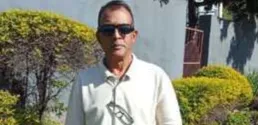Durban man seeks refuge in the US amid claims of injustices faced by the Indian community in SA
DONALD TRUMP

Robin Naidoo
Image: Supplied
ROBIN Naidoo, chairperson of the Indian Land Claimants Association (Ilca), believes there is hope for Indian South Africans as the US opens its doors to minorities facing discrimination.
According to the US embassy and consulates in South Africa, the refugee admissions programme for South Africans, according to President Donald Trump’s executive order, now includes disfavoured minorities – Indians and coloureds – who are victims of unjust racial discrimination.
Robin Naidoo is among the first Indians who is considering applying for the “opportunity”.
Naidoo was initially upset when Indians were not awarded the same opportunities as the 49 Afrikaners who left for the US on May 13.
He said he was delighted that minorities in South Africa could apply for “asylum” in the US.
“I am extremely grateful that the doors to the US are opened to all minorities. Our future growth has been stifled by over 200 laws in the country and sadly, I believe the ANC discriminates against us. This option to got to the US is under serious consideration by my family. It’s not just my decision but that of my family too. It’s a big decision so it has to be done correctly. They are keen but have to tie up loose ends, before we take the plunge,” said Naidoo.
He said he was considering this opportunity because of the “unfair discrimination Indians faced in South Africa”.
“The ANC government began the expropriation of land from Indian South Africans, soon after they took over power in 1994. The land that was taken away from us during apartheid was passed on to the ANC, by the outgoing white Nationalist Party. They expropriated the land from Indians pre-1994, under the apartheid laws, the Group Areas Act.
“Most of the expropriated land from Indians remained vacant and were soon illegally occupied by squatters in most cases. Yet, we are the minority race in South Africa with only two million Indians in the country,” said Naidoo.
“The ANC eyed our claimed land and without following the legal procedures under the Restitution of Land Claims Act, which was started by the white regime in 1992, the ANC started the illegal expropriation of our claimed land. In my view, this was racism and expropriation against Indians by the State for the second time,” said Naidoo.
He said given the history of Indians in South Africa, he along with others should have been offered refugee status by the US at the start of the programme when it was offered to the Afrikaner farmers.
"We faced appropriation of land without compensation, we were moved from our land. So what about our plights? The Afrikaners did not lose their land like we did.
“We would also like have better opportunities for our children. We lost our opportunities when we our farming land was expropriated,” he added.
“Thirty two years on and we have still not been given our land back. Why was the door to the US not opened to us from the beginning?” asked Naidoo.
He said that Indians, who have been victims of many injustices, were never treated the same as other races in South Africa.
“Our children struggle to get jobs despite their qualifications and experience. We are discriminated against, denied our land and university entrance. Yet we were not given the same mercy as the Afrikaner farmers. I want my children to have the same opportunities as others and now that we have been given the go-ahead, I hope my children’s lives will be better if we choose to take the offer and move to the US,” said Naidoo.
To be eligible for US resettlement consideration, individuals must be:
- Of South African nationality
- Of Afrikaner ethnicity or be a member of a racial minority in South Africa
- Able to articulate a past experience of persecution or fear of future persecution
